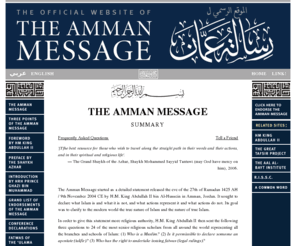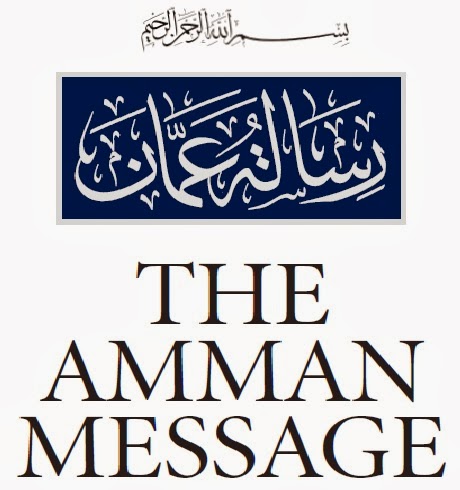Amman Message
The Amman Message (Arabic رسالة عمان / Risalat ʿ Ammān; engl Amman Message. ) Is an Islamic interfaith initiative and public opinion of senior Islamic scholars who published November 9, 2004 by King Abdullah II of Jordan and of a total of 552 Islamic scholars and personalities was signed. Amman is the capital of the Hashemite Kingdom of Jordan.
It demands tolerance and unity in the Muslim world and urges them to leave the extremism aside. Chairman of its Steering Committee was Prince Ghazi bin Muhammad, a cousin of the Jordanian king.
The text was by Sheikh al -Tamimi, the advisor of King Abdullah II of Islamic Affairs, Chief Justice and Chairman of the Fatwarates, in the presence of King Abdullah II during the Feast of Laylat al -Qadr ( Night of Power ) on 9 November, 2004 the Hashemiyya mosque in the district of Tla al- Ali in the northwest of Amman, performed. The speech was broadcast simultaneously in the Jordanian television and radio.
Three Questions of King Abdullah II
In 2004, King Abdullah II of Jordan sent the following three questions to twenty-four important Muslim scholars, representing all subgroups and schools of Islam around the world:
Three - point rule
Subsequently, a three-point regulation of 200 Islamic scholars from over 50 countries was set up in July 2005, which focuses on the following points:
(1 ) Recognition of the eight laws, and schools of thought ( madhhab Sg ) and the various currents of Islamic theology
( 2) to denote ban, supporters of the following directions as apostates:
( 3) ban, other than Muslims, approved to explain to unbelievers ( takfir ) (or to excommunicate )
Fatwas of the Ulema
This is a list of persons and organizations that have created in conjunction with the Amman Message issued a fatwa ( after listing the official website ):
Quote ( Jehan Sadat )
"Several years ago I watched with interest the publication of the so-called Amman Message ( Message of Amman ), which symbolizes both the diversity and the unity of Islam in my eyes. 2004 sent King Abdullah II of Jordan three questions for twenty-four of the most important Muslim scholars in the world, representing all subgroups and schools of Islam around the world: 1 Who is a Muslim? 2 Is it permissible to declare someone an apostate ( takfir )? 3 Who has the right to issue fatwas ( legal opinions )? Based on the fatwas that have issued these scholars - including the Sheikh of Al -Azhar, the highest Sunni authority, some of the most prominent Shiite ayatollahs as well as the most important religious leaders of Muslim states - was in July 2005 in Amman, an international conference on Islam with two hundred of the world's leading Islamic scholars held. There met these scholars who came from different countries and traditions, unanimous decisions on three fundamental questions. First, it confirmed the basic validity of all eight traditional and official schools of Islamic jurisprudence; secondly, they condemned categorically denounce a Muslim as takfir; and thirdly, they established who has the right to issue fatwas in the name of Islam. Since then, the Amman Message of around five hundred scholars, sheikhs, and heads of state has been signed, including Sunnis, Shiites, Sufis and representatives really all Muslim traditions. This is just one example of the many important ( and in the West to little perceived) measures through which the Umma of the brutal violence distanced perpetrated in their name. "









